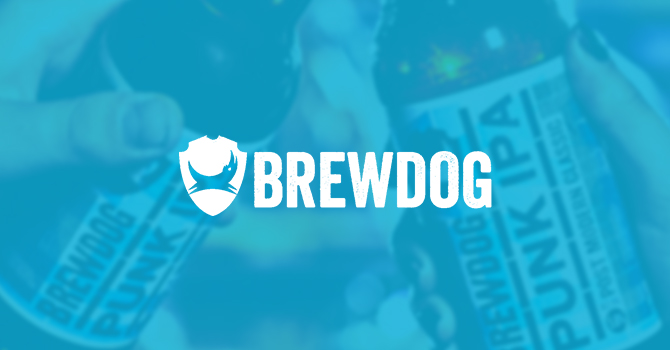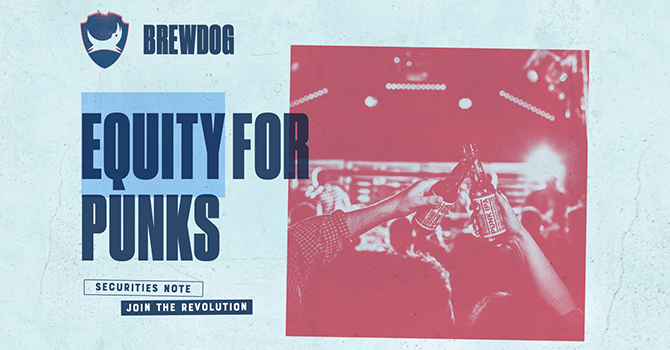
Scottish craft beer maker BrewDog’s U.S. operations posted strong growth in 2019. Production at the Scotland-headquartered craft brewery’s facility in Columbus, Ohio, increased nearly 46%, to 53,000 barrels, chief revenue officer Adam Lambert told Brewbound.
In 2020, Lambert said BrewDog is asking its wholesalers to maintain focus on the company’s core beer portfolio, with an occasional shift to new product lines, including non-alcoholic offerings in the “AF” line and a nitro series, as well as limited releases.
“Apart from Punk IPA, which is flat, everything else is growing like crazy, so it’s continuing to drive distribution on those day-in, day-out beers, along with offering up our Limiteds and our Amplifieds and the nitros and the AFs, so there’s fun and excitement on the side,” he said.
The Headliners, BrewDog’s name for its core lineup — which includes Punk IPA, Elvis Juice IPA, Jet Black Heart oatmeal milk stout, Hazy Jane IPA, Cocoa Psycho imperial stout, Clockwork Tangerine IPA and Lost Lager — account for more than 90% of its U.S. business.
Last year, Elvis Juice increased depletions (sales to retailers) 94%, and now accounts for 8% of the company’s sales, while Hazy Jane depletions grew 85%, Lambert said.
Meanwhile, Punk IPA, the company’s flagship, is having “a little bit of an identity crisis,” he added.
“It’s a really well-built beer, but it’s not overly IPA in style,” Lambert said, adding that the beer is more similar in style to an American pale ale. “In the rest of the world, it’s a pretty big IPA because the rest of the world drinks differently than us.”

New Products
BrewDog’s new nitro series will roll out in Q1 with a nitrogenated version of Jet Black Heart with espresso both on draft and in 16 oz. cans. Nitro beers will change seasonally. BrewDog believes there’s room in the market for more nitrogenated craft beers.
“It’s under-serviced by a lot of breweries,” Lambert said.
Other new products for 2020 include the AF line, non-alcoholic beers in four styles. Pale ale Nanny State and Punk AF are both currently available, while Stout AF and Hazy AF will be released by the end of Q1.
“It’s a two-pronged approach,” Lambert said. “We want to go after craft N/A, craft A/F, whatever we want to call it, and on top of that we’ll have, stylistically, four beers that will be very different.”
BrewDog hopes to target social occasions and drinkers seeking moderation for health purposes, but the company is open to seeing how other consumer bases develop for the style.
“You’re kind of tackling three or four different consumer groups that are out there,” Lambert said. “I wish I had a crystal ball and could pinpoint what’s happening because I think it is a growing category.”
Although the non-alc space has gotten a bit more crowded recently with entrants from large brewers such as Heineken 0.0 and Molson Coors’ Coors Edge, as well as several craft companies such as Athletic Brewing and Surreal, Lambert said BrewDog’s AF line’s styles differentiate them from the pack of alcohol-free lagers.
“Flavor-wise, it’s just been left alone,” he said.
Lambert expects the AF line to make up between 2% and 3% of the company’s sales in the U.S. this year. A marketing campaign focusing on education for consumers and wholesalers will launch in Q1. Earlier this month, BrewDog opened an alcohol-free bar in London to showcase its non-alc offerings.
New Distribution
In 2019, BrewDog entered a handful of new markets — five new states and Washington, D.C. — but those expansions only contributed 6% of BrewDog’s volume, Lambert said. Instead, the company is working on penetrating its current markets, adding 23 new wholesalers to spread farther into its footprint.
“Part of our strategy in 2019 was to add a few more states, but fill out the footprint we’re already in, so that was actually a 74% increase in the amount of wholesalers that we had compared to the year prior, and those guys accounted for 12% of our total business,” Lambert said.
The company’s Columbus, Ohio-based brewery produces beer for 14 states in a footprint that extends as far west as Illinois, south to Georgia and north to New York. But that could soon change.

New Locations
With a third round of crowdsourced investment from its latest Equity for Punks campaign, which launched in November, BrewDog plans to build or buy a brewery in California.
“We’ve got our 100,000 sq. ft. brewery here in Columbus, Ohio, but there’s such an amazing craft beer scene on the west coast that we would love to be locally a part of that,” special projects manager Keith Bennet told Brewbound. “Obviously, from Ohio to California and the West Coast is a long way to send beer, which we can do, but we’d also love to have what we call a BrewDog Outpost on the West Coast.”
Bennet has looked from Northern California to San Diego for either blank slates or existing facilities.
“Ideally we’d look for a turnkey opportunity if it was available,” he said. “That would be fantastic, to be able to go into an existing space and make it a BrewDog bar and brewpub.”
BrewDog’s physical presence in the U.S. has grown since the company first broke ground on its Columbus brewery in the winter of 2015. BrewDog operates a taproom and the DogHouse Hotel at its Columbus brewery, two other taprooms in Columbus, one taproom in Cincinnati, one taproom in Indianapolis and will open one taproom in Pittsburgh later this year.
Another goal of the third round of Equity for Punks is to expand the company’s hospitality business to rentable apartments above its bars, called Kennels. The first is planned for BrewDog’s Short North location in Columbus. Like the DogHouse Hotel, the apartments would be stocked with beer, among other perks.
“Everything is about creating this incredible beer-themed experience where you can come stay above one of our bars and have a gorgeous space with incredible room amenities,” Bennet said. “They’ve got some of the best beer from around the world in them.”
So far, the third investing round has raised more than $500,000 from more than 1,100 investors as of January 21. It closes in 112 days, according to BrewDog’s website. The first two U.S. rounds raised more than $9.7 million from nearly 15,000 investors.
“We’re obviously extremely excited about it,” Bennet said of the program. “It’s something very unique to BrewDog, and something that we love that creates an incredible community for us.”
